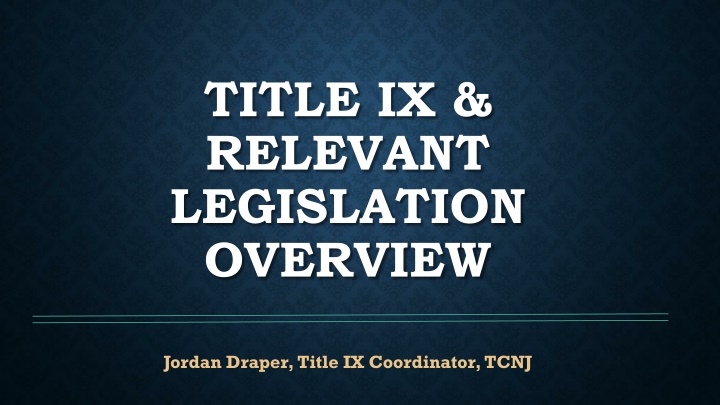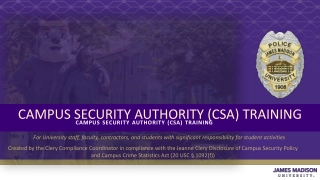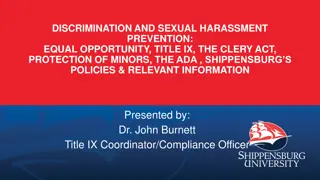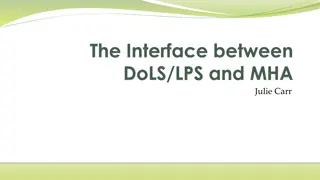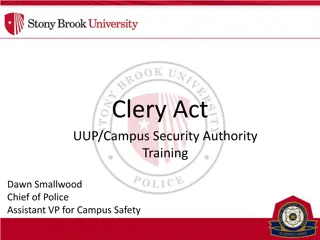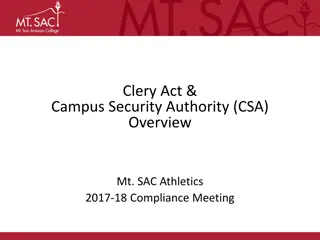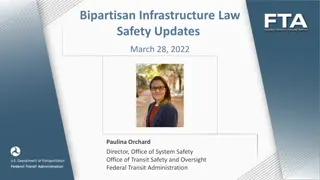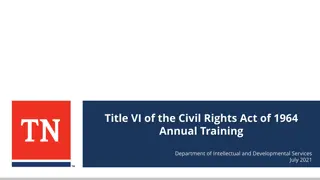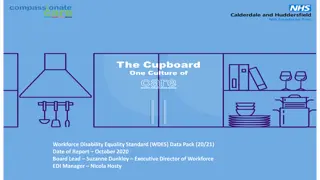Overview of Title IX and Relevant Legislation including Dear Colleague Letter and Jeanne Clery Act
Title IX ensures no discrimination based on sex in federally funded education programs. The 2011 Dear Colleague Letter provides guidance on handling sexual harassment cases, emphasizing prompt, fair investigations. The Jeanne Clery Act requires schools to disclose campus crime statistics and maintain a safe environment, especially in cases of sexual assault, dating violence, and stalking.
Download Presentation

Please find below an Image/Link to download the presentation.
The content on the website is provided AS IS for your information and personal use only. It may not be sold, licensed, or shared on other websites without obtaining consent from the author.If you encounter any issues during the download, it is possible that the publisher has removed the file from their server.
You are allowed to download the files provided on this website for personal or commercial use, subject to the condition that they are used lawfully. All files are the property of their respective owners.
The content on the website is provided AS IS for your information and personal use only. It may not be sold, licensed, or shared on other websites without obtaining consent from the author.
E N D
Presentation Transcript
TITLE IX & RELEVANT LEGISLATION OVERVIEW Jordan Draper, Title IX Coordinator, TCNJ
TITLE IX IN THE NEWS Stanford University Baylor University Columbia University Carry the Weight Campaign Florida State University University of Virginia The Hunting Ground Movie Others??
WHAT IS TITLE IX? No person in the United States shall, on the basis of sex, be excluded from participation in, be denied the benefits of, or be subjected to discrimination under any education program or activity receiving Federal financial assistance.
2011 DEAR COLLEAGUE LETTER A significant guidance document issued by the OCR Expands upon 2001 Revised Sexual Harassment Guidance OCR advises recipients to: Grievance procedures must be prompt and equitable Investigation must be adequate, reliable, and impartial Both parties must have opportunity to present witnesses and other evidence Both parties must be afforded similar and timely access to any information that will be used at hearing All persons involved must have training or experience in handling complaints of sexual harassment and sexual violence and in the college s grievance procedures
JEANNE CLERY ACT (VAWA) The Jeanne Clery Disclosure of Campus Security and Campus Crime Statistics Act (Clery Act), 20 U.S.C. 1092(f), enacted in 1990, requires schools that receive federal financial assistance either directly or indirectly to maintain and publish information about crime on or near their campus The purpose of the Clery Act is to provide students, their families, and employees with accurate, complete, and timely information about campus safety to better inform future decisions Disciplinary procedures for sexual assault, dating violence, domestic violence and stalking must provide prompt, fair and impartial investigation and resolution Proceedings (including investigations) must be conducted by persons who receive annual training on issues related to these crimes/violations Both parties entitled to same opportunities to have others present, including the opportunity to be accompanied by an advisor of their choice Both parties shall be simultaneously informed in writing of Outcome Appeals procedures Any change to the results that occurs prior to final resolution When results become final
WHAT DOES TITLE IX MEAN? Prohibits sexual harassment, including sexual violence and all forms of sexual misconduct Places obligations on institutions regardless of any law enforcement action School must provide appropriate interim remedies to address safety and well-being of both parties prior to the final outcome of the investigation If a school knows or reasonably should have known about sexual harassment (including sexual violence), the school must take immediate action to eliminate the harassment prevent its occurrence address its effects Protects faculty, staff, students and third parties
SCOPE OF TITLE IX Sex discrimination and harassment Verbal Physical Electronic Sexual violence Rape Sexual Assault Exploitation Stalking Cyberstalking Interpersonal violence Intimate partner violence Domestic violence Dating violence Relationship violence Retaliation Gender-based discrimination and harassment
WHAT DOES THE TITLE IX OFFICE DO? Meet with both parties to describe rights, resources, and options for investigations (college and criminal) Initial Meetings Designed to help students who may need support from the college Can be assigned with or without moving forward Interim Measures Meet with reporters and respondents to go over their rights through the Title IX Process Conduct or advise all investigations Investigations Online Trainings In-person trainings Investigator trainings Training & Education
WHAT DO YOU HAVE TO DO AS AN RE? Report ALL information to Title IX Coordinator REPORT: Name of Victim Name of Alleged Person STALKING SEXUAL ASSAULT DATING VIOLENCE DOMESTIC VIOLENCE SEXUAL HARASSMENT All details regarding the incident Report information immediately TCNJ is on notice once you know this information so contact the Title IX Coordinator within 24 hours of receiving the report Report through Email: draperj@tcnj.edu Phone: 609-771-3266 Online Reporting System: titleix.tcnj.edu File a Report Be caring & compassionate
Faculty/Staff Roles We do not want you to serve as a mental health professional If you are unsure how to proceed, you can call Anti-Violence Initiatives for advice while still keeping confidentiality You will not be required to share the student s name or information You can also ask the student if you can call together to learn about resources and options they can access if they would like to You are chosen because you are trusted Your student wants you to listen and believe TCNJ wants you to listen, support and encourage the student to receive help from an appropriate mental health professional Please respect the student s right to privacy Provide the student with information about the resources available
WHAT HAPPENS AFTER AN INCIDENT IS REPORTED TO THE TIX COORDINATOR? Initial assessment Gather enough information to determine if this is a Title IX case Written notice to Reporter of reporting options and support services Interim measures/accommodations Consider requests for confidentiality Repeat offenders Accused poses an imminent threat of danger to the complainant or the community Accused has access to a vulnerable community Determine if Reporter will participate in investigation Written notice to both parties of investigation Process; rights of parties; advisors
